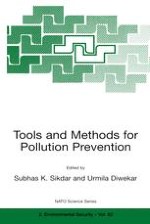
1999 | OriginalPaper | Chapter
Tools for Pollution Prevention
Authors : Subhas K. Sikdar, Jiøí Drahoš, Enrico Drioli
Published in: Tools and Methods for Pollution Prevention
Publisher: Springer Netherlands
Included in: Professional Book Archive
Activate our intelligent search to find suitable subject content or patents.
Select sections of text to find matching patents with Artificial Intelligence. powered by
Select sections of text to find additional relevant content using AI-assisted search. powered by
Eliminating that activity altogether can prevent man-made pollution from any specific activity. In view of the attendant benefits accrued from human endeavors, this is obviously not a desirable outcome. A somewhat more practical scope of pollution prevention, which offers incremental reduction in pollution, is given by the US Pollution Prevention Act, 19901. According to the Act, pollution prevention means “source reduction” and other practices that reduce or eliminate the creation of pollutants through (i) increased efficiency in the use of raw materials, energy, water, or other resources, or (ii) protection of natural resources by conservation. Source reduction in the Act is defined as any practice which (i) reduces the amount of any hazardous substance, pollutant, or contaminant entering any waste stream or otherwise released into the environment prior to recycling, treatment, or disposal; and (ii) reduces the hazards to public health and the environment associated with the release of such substances, pollutants, or contaminants. The National Commission on the Environment (NCE)2gives a more expansive definition of pollution prevention that does include recycling/reuse of material which would otherwise be released as wastes. In essence, pollution prevention is a term that represents realization of pollution reduction resulting from purposeful improvement in the designs of products and processes, rather than definite elimination of pollution. Rational design of products and processes requires appropriate scientific and engineering tools that aid in the analyses of specific situations and comparative cleanliness of competing approaches.Such toohs are only beginning to be developed, and the rest of the chapters in this book contain the dominant and emerging examples.